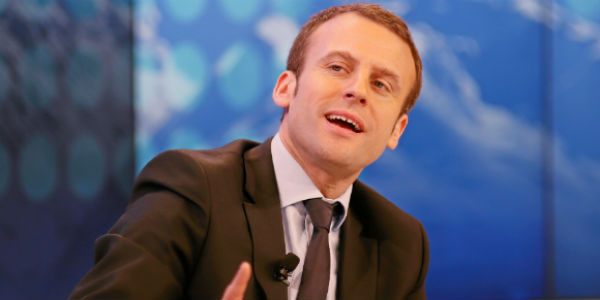Emmanuel Macron and En Marche! – left, right or simply on the move?
Emmanuel Macron, the leader of France’s new En Marche! movement, announced he would run for the French presidency this week. Who is this self-proclaimed ‘outsider’, and is he really as distant from the political establishment as he claims to be? Susan Milner looks at the challenges facing Macron as he joins a crowded field of presidential candidates.

Emmanuel Macron speaks at Davos, January 2016. Photo: World Economic Forum via a CC BY-NC-Sa 2.0 licence
France is used to new political formations being established to support the ambitions of individual politicians. But Emmanuel Macron’s En Marche! grouping, formed in April 2016, is different from most: it is not a party, and more importantly is not affiliated to any party; as such, its membership is loose and open; and it is drawing support from young people as well as some older voters and politicians disillusioned with mainstream parties.
Macron, a former economy and finance minister, ended months of speculation on 16 November by announcing he will stand as candidate for next year’s presidential election. Although the news surprised nobody, Mr Macron had kept commentators guessing about when he would announce his decision to run. Three main factors explain the timing, coming as it does just ahead of the first round of the primaries to decide the mainstream right-wing candidate on 21 November, which currently dominates media discussion.
First, once the centre-right candidate is known, and as pressure increases on President Hollande to declare whether he will stand for re-election, the field will become crowded. By announcing early, Macron aimed to stand out from the crowd and to emphasise his USP as being ‘his own man’, independent of the party selection timetables. In this respect, his campaign launch – although somewhat lacklustre in its own terms – was able to gain significant media traction.
Second, Macron has been able to capitalise on the current state of uncertainty surrounding the Socialist Party. The press has been awash with speculation on the position of prime minister Manuel Valls, Macron’s former ally and closest rival in terms of policy profile and potential support. If Hollande decides to ignore the polls and the advice of many of his close advisors and colleagues, including reportedly his prime minister, and declares his candidature, Valls will find it difficult to oppose him in the Socialist Party primaries. By leaving things so close to the deadline for throwing hats into the ring, Hollande has not only made things tricky for the prime minister but also effectively hobbled government in the crucial run-up to the election campaign, as the rift between the two men comes under media scrutiny. Macron’s resignation from the government in August (reportedly he wanted to leave in July, but was forced to wait after the Nice attack) left him free to develop an independent position whilst Valls has been harnessed to the government and president.
Third, the US elections have thrown France’s already volatile electoral landscape wide open. So far the only thing on which experts can agree is that it is impossible to predict what voters are thinking and planning to do. As some politicians seek to respond by repositioning themselves on the populist right, others have sought to emphasise their ‘outsider’ status. Amidst the liberal anguish about Donald Trump’s election, Macron moved swiftly to distance himself from the political establishment. Although he was (relatively briefly, from 2014 to 2016) in charge of steering government economic policy, his background and his approach to policy distinguish him sharply from most other candidates. In his short speech announcing his candidature, Mr Macron positioned himself as a critic of not just the current government but of a political establishment in crisis, beset by ‘blockages’ and managerialist conformism.
Pollsters point out that so far En Marche!’s support is limited to a narrow social base. Interestingly, although the political figures who have so far come out in support of Macron are all on the centre-left (most prominently, the Socialist mayor of Lyon, Gérard Collomb), he has influential business networks, and polls suggest his electoral appeal lies mostly on the right.
Although Macron is the undoubted rising star of the French political landscape, the most recent polls suggest his electoral support has stuck at around 18%. Previous election history indicates that is not enough to get him near the presidency. However, in a context of deep disaffection and discontent which has led pollsters astray more than once, Macron’s deliberately disconcerting style and method could yet end up confounding predictions.
Of course, as his political rivals have mockingly riposted, Mr Macron is not so much an outsider as a pure product of the economic and political elite. But he rightly sees that in other countries wealth does not bar political candidates from presenting themselves as establishment outsiders, let alone ‘men of the people’. However, for Macron – just as for others wishing to position themselves in a crowded electoral field and in an uncertain climate – his two main USPs are also potential weaknesses. His youth, self-confidence and astonishing rise to power, combined with his lack of political baggage, make him attractive to an aspirational electorate disillusioned with their leaders and impatient for change. It is nevertheless difficult to take on the challenge of a presidential election without the support a huge organisational and media machinery. Effectively, Mr Macron has to rely on a combination of his own charisma, largely based on novelty, youth and determination, and on the lack of credible liberal-progressive candidates. A convincing sprint by Valls or a strong media campaign by a centre-leaning mainstream right candidate (depending on the outcome of primaries on the right) could block off support for Macron beyond his current, fairly limited constituency, and deprive him of political support and media networks.
As yet, his policy proposals look lightweight and under-developed, although the long-awaited book outlining his manifesto is promised imminently. Macron has made a virtue of being difficult to pin down, casting this as freedom from dogma and the capacity to act rationally and responsively to tackle real-world problems. This makes it difficult to convince voters of the authority associated with the ‘regalian’ character of the presidency. Mr Macron still has time, but he has a long way to go.
This post represents the views of the author and not those of Democratic Audit.
 Susan Milner is Reader in European Politics at the University of Bath.
Susan Milner is Reader in European Politics at the University of Bath.





 Democratic Audit's core funding is provided by the Joseph Rowntree Charitable Trust. Additional funding is provided by the London School of Economics.
Democratic Audit's core funding is provided by the Joseph Rowntree Charitable Trust. Additional funding is provided by the London School of Economics.
PoLIS’ Dr Susan Milner writes for Democractic audit UK…https://t.co/gI39jEEmQD
‘Emmanuel Macron has made a virtue of being difficult to pin down, casting this as freedom from dogma’ Susan Milner https://t.co/lAJgwd0lWb
Emmanuel Macron and En Marche! – left, right or simply on the move? https://t.co/8DeVXodQ0H
The problem for all these candidates of supposed ‘left’ or ‘right’ is they fall squarely into the same mould as Hollande – elected on one platform…and the next day, to appease the demands of the German government and the EU do precisely the opposite of what they were elected to do. Just like Tsipras in Greece, who now leads the most right wing austerity-enforcing government in the EU. The left – and it seems even the challenging and upcoming new left like Syriza in Greece – will simply sell out or cave in at the first severe look from their masters in Berlin and Brussels.
Fine, we now know that the left pretty much will never deliver on their promises and that they are probably all insincere when they make them or imply that they will do anything left wing. Just holding the line for the elite and the establishment and the rigged capitalism that they serve and prosper by personally themselves.
But now that this is known, and people like Macron simply look like awful visions of more of the same, it is little surprise that the working class and young are flocking to the Front National. Who wants the Sarcrons or Mackozys and their me-too running after the votes with weasel words when you can have the real thing?
Emmanuel Macron and En Marche! – left, right or simply on the move? https://t.co/eWqypdRSgx
Could Emmanuel Macron win the French presidency? Susan Milner of @UniofBath on the En Marche! phenomenon https://t.co/lAJgwcIKxB
Emmanuel Macron and En Marche! – left, right or simply on the move? https://t.co/lAJgwcIKxB https://t.co/RzdClgNUwC